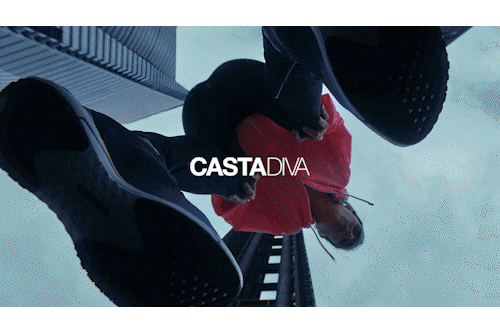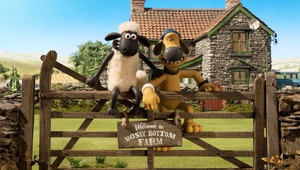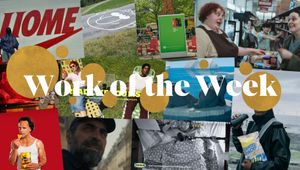
Uprising: Chelsea Galloway’s Impeccable Work Ethic

When she was younger, Chelsea Galloway envied those of her peers who knew how to respond to the question ‘What do you want to be when you grow up?’. Her answer would always hover around the ‘not sure yet’ area, and that didn’t change much as she went to school. While she did have a more focused interest in creative subjects, she also loved reading and writing in her own time, and was seriously involved in swimming (which continues to be a hobby today). In Chelsea’s year six leavers book, she persisted with the pattern of vagueness regarding her future aspirations, leaving nothing but a note saying she would figure it out later. Little did she know, her perfect job already existed.
But back then, swimming was her only concrete passion - after joining the local swimming club, Chelsea volunteered through her teenage years and eventually qualified to become a swimming teacher. At 16, she started lifeguarding to save money to go to university, but generally she had been working ever since she could. “I have always enjoyed working hard whether that be at school or any workplace. My family is very relaxed and supportive, which I’m always grateful for. Growing up in a small village in Somerset, it was also important for me to learn how to drive, so I wanted to work as soon as I could to be able to afford to do that. It was such an achievement being 17 and buying my little Renault Clio.”
So, for somebody who didn’t know what they’d become when they grew up, Chelsea sure worked hard and threw herself into every opportunity. There was one running thread however - Chelsea’s aunt worked in TV and from an early age, Chelsea would ask to go to set with her. Today, she is still one of the people Chelsea looks up to for creative inspiration. “When I was old enough, she was able to offer me work experience on one of her projects,” she says. “This opportunity was inspiring and it drove me to continue my career into the industry.” But more on that later.
After a few small hiccups and a gap year, Chelsea found herself studying media and journalism at the University of the West of England in Bristol, where she’s still based. “I had the best three years and I’d love to relive it,” she says looking back on her university days. “I felt university was an incredible life experience and helped me prepare for my career.”
During her time at university, she got her very first industry opportunity. As a floor runner on the Netflix series ‘The English Game’, Chelsea got stuck in for a whole eight weeks on set and moved to Manchester by herself - a scary experience in hindsight, but one that she feels opened her eyes for that part of the media industry. “I met so many experienced people and learnt so much during my time on the job. I went back to university with a taste of the media industry under my belt and feeling motivated to complete my final year studies.”
Post university, despite the pandemic proving an incredibly tough time to graduate, Chelsea managed to secure two remote internships in digital communication roles - one for Knowle West Media Centre and the other for Hinkley Point C Balfour Beatty. Both she remembers as being ‘super insightful’ and introduced her to a wider world of communications, split between two very different audience demographics. After a little while, she finally got the chance to go back to TV and worked as a production assistant on a feature film for Marvel Studios.
Looking back, the Marvel experience was one that Chelsea believes changed the trajectory of her career. “It was so much larger and complex than anything I had done before, and I felt like it was a great entrance to the film industry.” An overall positive experience, with some important challenges, the film nurtured Chelsea’s skills to work in bigger teams and handle the pressure of big budget. It also taught her that to learn about production, one needs to throw themselves into it and ask every question under the sun. “It helped me to evaluate and steer my career in new directions when I concluded it, and I was fortunate to get a job at Aardman,” she says.
Importantly, however, Chelsea took some time off after the Marvel project to really focus on herself - doing heaps of research and thinking about what motivates and drives her. “I outlined my goals and what I wanted to achieve with my career. That time allowed me to pause and evaluate what I wanted to do next.” The conclusion was clear - Chelsea loved Bristol and wanted to stay, and she didn’t fall for the lure of living out of a suitcase on sets around the country. But she still loved the production environment and the creativity that came with it. All of these requirements left one clear winner - Aardman.
There, one of Chelsea’s very first projects happened to be BBC’s Christmas idents in 2021, featuring Shaun the Sheep. “I remember fondly going down to modelmaking and meeting Shaun and the flock and seeing the tiny props being built,” she says. “It was such a great introduction to working at Aardman in the creative services department. So much fun and a team of great people, during which I learned a lot more about the production process. I love reflecting on it because I’ve learned even more since.”
Today, Chelsea’s favourite part of her job is still seeing those tiny moving parts come together as well as getting to meet and work with the creatives behind them. “I enjoy the challenge that every project will run slightly differently and I enjoy adapting the way I work to make that go smoothly. I love the collaborative nature I get to have being a production coordinator, and my goal is always the ultimate success of every project I’m part of.” And while she loves collaboration, keeping track of all the moving parts of a production is incredibly tough work. Chelsea knows that effective communication to both seniors and new crew members is her key to success here, and she has learned that clarity is paramount. Lists and trackers are a producer’s best friend.
She keeps on top of it all through constantly conversing with her teams - both during, and outside of projects. This, and adaptation and experimentation with new tech, is what keeps her fresh and helps her celebrate success all across the industry. And, of course, watching cool animations.
When it comes to the debates in her specialism, Chelsea wishes that access into the industry for juniors and entry level workers was less guarded than it is today. “I have definitely seen more opportunities recently being opened up, I’m a big advocate of the fact that people shouldn’t work for free to gain opportunity. This is something that doesn’t happen in Aardman, but I know it happens in a lot of other companies,” she says. Of course, lack of access for juniors is one of the spirals that lead to a less diverse workforce in media - something Chelsea is passionate about. “Women and people of colour are underrepresented in creative and executive ranks of the industry as a whole, this is especially true in male oriented roles,” she says. “However, I do know that there has been an increase in awareness in the animation industry of the importance of diversity. This led to initiatives such as the Women in Animation membership program and Aardman’s ‘Aardwomen’ mentorship scheme, which I’m also part of.”
A subject with less awareness around it, however, is accessibility, which Chelsea believes is due to the lack of open conversation. “This could additionally be supported by a lack of resources available to help studios make their work more accessible. For example, it isn’t widely known that some struggle to read certain colour fonts. I did a study at university that specifically looked at making TV production more accessible to people with cognitive disabilities - this could involve using simpler language, providing more visual cues, or avoiding sensory overload. This type of example I don’t think is always considered.”
Chelsea gets excited for the opportunity to make a difference in all of these spheres and beyond. Impact is what drives her - something she knew before Aardman and is able to explore through her work there. “I worked on a film in collaboration with Save The Children which was incredibly emotive and educated a wide audience about the refugee crisis. I love seeing these out there in the world having an impact.”
Unlike some, Chelsea also admits to anticipating tech developments with open arms, as a way to help creativity in animation to unfold even further. “The growing use of animation in VR and AR are two emerging technological developments that I think will be incredibly powerful. I am also super interested to see where AI takes us.”
From a swimming coach who didn’t know what they’d be when they grew up, to a production coordinator, Chelsea has always been motivated by her impact on people’s lives. Today, her desire to learn is greater than ever and the satisfaction of pulling off complicated projects is growing with every new challenge. “I love learning, talking, organising and communicating,” she concludes. “And I love seeing animated content that allows for great creativity, used as a form of powerful storytelling that educates and entertains.”















